BMW X1 vs Skoda Superb Combi – Which car suits you better?
Everyday use, family trips or long-distance drives – here’s where the differences show.
Discover whether BMW X1 or Skoda Superb Combi fits your lifestyle better.
Costs and Efficiency:
Looking at overall running costs, both models reveal some interesting differences in everyday economy.
Skoda Superb Combi has a minimal advantage in terms of price – it starts at 35200 £, while the BMW X1 costs 38200 £. That’s a price difference of around 3000 £.
Fuel consumption also shows a difference: Skoda Superb Combi manages with 0.40 L and is therefore clearly more efficient than the BMW X1 with 0.80 L. The difference is about 0.40 L per 100 km.
As for range, the Skoda Superb Combi performs distinct better – achieving up to 134 km, about 51 km more than the BMW X1.
Engine and Performance:
Power, torque and acceleration say a lot about how a car feels on the road. This is where you see which model delivers more driving dynamics.
When it comes to engine power, the BMW X1 has a somewhat edge – offering 326 HP compared to 265 HP. That’s roughly 61 HP more horsepower.
In acceleration from 0 to 100 km/h, the BMW X1 is minimal quicker – completing the sprint in 5.40 s, while the Skoda Superb Combi takes 5.70 s. That’s about 0.30 s faster.
There’s no difference in top speed – both reach 250 km/h.
There’s also a difference in torque: BMW X1 pulls slightly stronger with 477 Nm compared to 400 Nm. That’s about 77 Nm difference.
Space and Everyday Use:
Cabin size, boot volume and payload all play a role in everyday practicality. Here, comfort and flexibility make the difference.
Both vehicles offer seating for 5 people.
Both models weigh roughly the same – around 1575 kg.
In terms of boot space, the Skoda Superb Combi offers distinct more room – 690 L compared to 540 L. That’s a difference of about 150 L.
In maximum load capacity, the Skoda Superb Combi performs slightly better – up to 1920 L, which is about 320 L more than the BMW X1.
When it comes to payload, Skoda Superb Combi somewhat takes the win – 584 kg compared to 500 kg. That’s a difference of about 84 kg.
Who comes out on top?
Overall, the Skoda Superb Combi shows itself to be dominates this comparison and secures the title of DriveDuel Champion.
It convinces with the more balanced overall package and proves to be the more versatile choice for everyday use.
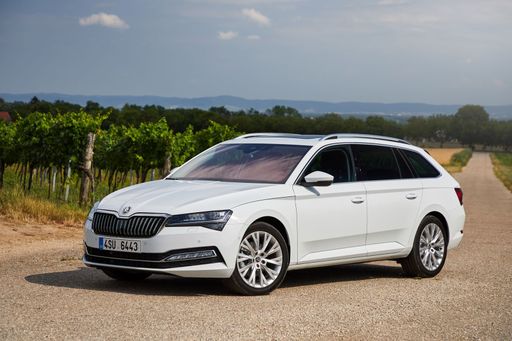
Skoda Superb Combi
BMW X1
The new BMW X1 effortlessly blends sporty elegance with practical functionality, making it a standout choice in the compact SUV segment. Inside, the sophisticated cabin design is complemented by high-quality materials and cutting-edge technology, creating a welcoming and advanced driving environment. On the road, the vehicle's agile handling and responsive performance promise an engaging driving experience, whether navigating urban streets or embarking on longer journeys.
details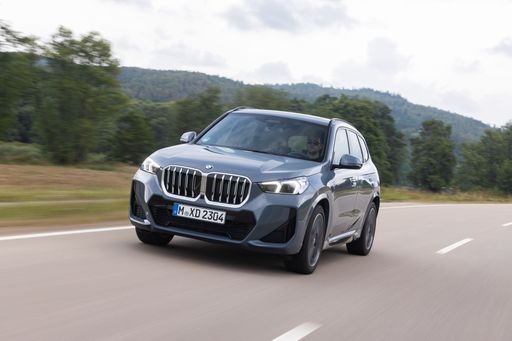 @ press.bmwgroup.com
@ press.bmwgroup.com
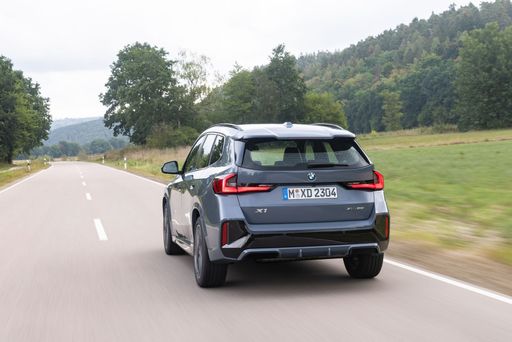 @ press.bmwgroup.com
@ press.bmwgroup.com
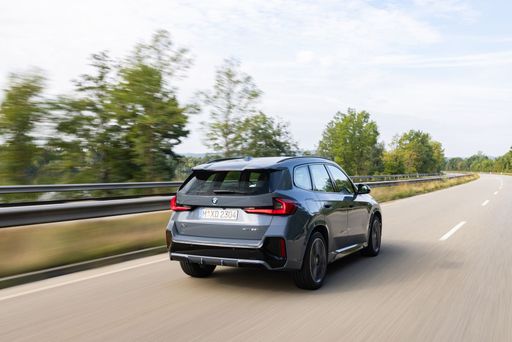 @ press.bmwgroup.com
@ press.bmwgroup.com
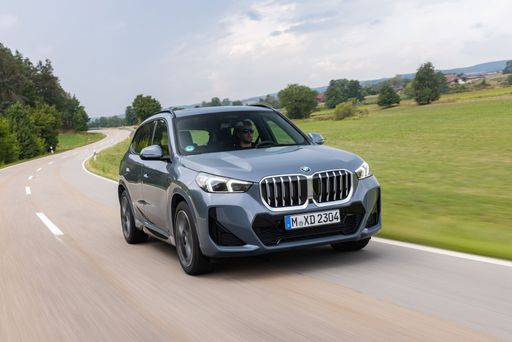 @ press.bmwgroup.com
@ press.bmwgroup.com
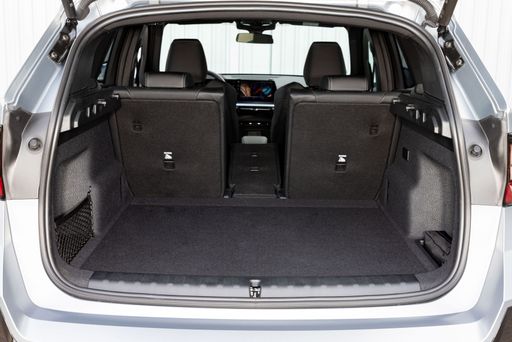 @ press.bmwgroup.com
@ press.bmwgroup.com
Skoda Superb Combi
The Škoda Superb Combi combines practicality and elegance, making it a popular choice for families and professionals alike. Its spacious interior offers exceptional comfort and ample storage, suitable for long journeys and everyday errands. Additionally, the refined design and advanced technology features ensure a sophisticated driving experience.
details @ Skoda Presse Deutschland
@ Skoda Presse Deutschland
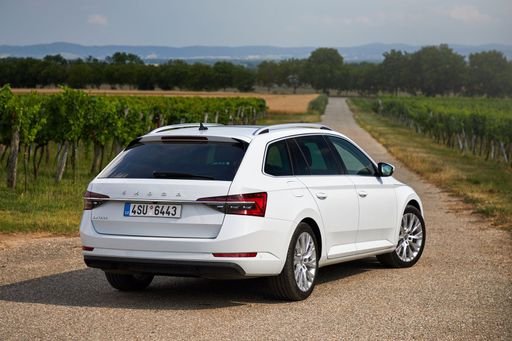 @ Skoda Presse Deutschland
@ Skoda Presse Deutschland

|

|
|
|
|
Costs and Consumption |
|
|---|---|
|
Price
38200 - 55500 £
|
Price
35200 - 51000 £
|
|
Consumption L/100km
0.8 - 7.7 L
|
Consumption L/100km
0.4 - 7.8 L
|
|
Consumption kWh/100km
-
|
Consumption kWh/100km
-
|
|
Electric Range
83 km
|
Electric Range
124 - 134 km
|
|
Battery Capacity
14.20 kWh
|
Battery Capacity
19.70 kWh
|
|
co2
17 - 175 g/km
|
co2
8 - 178 g/km
|
|
Fuel tank capacity
47 - 54 L
|
Fuel tank capacity
45 - 66 L
|
Dimensions and Body |
|
|---|---|
|
Body Type
SUV
|
Body Type
Estate
|
|
Seats
5
|
Seats
5
|
|
Doors
5
|
Doors
5
|
|
Curb weight
1575 - 1935 kg
|
Curb weight
1575 - 1853 kg
|
|
Trunk capacity
490 - 540 L
|
Trunk capacity
510 - 690 L
|
|
Length
4500 - 4505 mm
|
Length
4902 mm
|
|
Width
1845 mm
|
Width
1849 mm
|
|
Height
1622 - 1642 mm
|
Height
1482 mm
|
|
Max trunk capacity
1495 - 1600 L
|
Max trunk capacity
1770 - 1920 L
|
|
Payload
490 - 500 kg
|
Payload
497 - 584 kg
|
Engine and Performance |
|
|---|---|
|
Engine Type
Diesel MHEV, Petrol MHEV, Plugin Hybrid, Petrol, Diesel
|
Engine Type
Plugin Hybrid, Petrol, Petrol MHEV, Diesel
|
|
Transmission
Automatic
|
Transmission
Automatic
|
|
Transmission Detail
Dual-Clutch Automatic
|
Transmission Detail
Dual-Clutch Automatic
|
|
Drive Type
Front-Wheel Drive, All-Wheel Drive
|
Drive Type
Front-Wheel Drive, All-Wheel Drive
|
|
Power HP
136 - 326 HP
|
Power HP
150 - 265 HP
|
|
Acceleration 0-100km/h
5.4 - 9.2 s
|
Acceleration 0-100km/h
5.7 - 9.3 s
|
|
Max Speed
190 - 250 km/h
|
Max Speed
220 - 250 km/h
|
|
Torque
230 - 477 Nm
|
Torque
250 - 400 Nm
|
|
Number of Cylinders
3 - 4
|
Number of Cylinders
4
|
|
Power kW
100 - 240 kW
|
Power kW
110 - 195 kW
|
|
Engine capacity
1499 - 1998 cm3
|
Engine capacity
1498 - 1984 cm3
|
General |
|
|---|---|
|
Model Year
2023 - 2025
|
Model Year
2024 - 2025
|
|
CO2 Efficiency Class
D, E, B, F
|
CO2 Efficiency Class
B, E, F, D, G
|
|
Brand
BMW
|
Brand
Skoda
|
Is the BMW X1 offered with different drivetrains?
The BMW X1 is offered with Front-Wheel Drive or All-Wheel Drive.
The prices and data displayed are estimates based on German list prices and may vary by country. This information is not legally binding.
